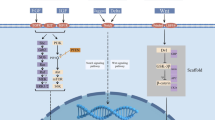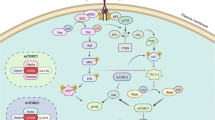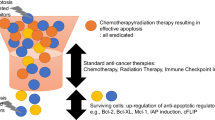Summary
To investigate the relationship between the expression of early growth response gene 1 (EGR-1) and p38MAPK pathway in the paclitaxel resistance of ovarian carcinoma cells, the effect of p38MAPK inhibitor SB203580 on cell apoptosis was examined by using Hoechst 33258 staining. The intracellular Rh123 (Rhodamine 123) accumulation was detected by the flow cytometry (FCM). The 50% inhibition concentration (IC50) of paclitaxel for A2780/Taxol cells was determined by MTT method. Electrophoretic motility shift assay (EMSA) was employed to examine the EGR-1DNA binding activity. MDR1 and EGR-1 mRNA were assessed by RT-PCR. The expressed of p-gp, phosphorylated p53 and p38 were detected by Western blotting. SB203580 could remarkably promote the apoptosis of A2780/Taxol cells, and the cell apoptosis was in a time-dependent manner. Cellular Rh123 accumulation was increased, and the IC50 of paclitaxel for A2780/Taxol cells was decreased significantly. A2780/Taxol cell line after SB203580 treatment was shown to have a significantly higher level of EGR-1 DNA binding activity. SB203580 down-regulated the activity of p38MAPK pathway, but up-regulated EGR-1 expression. SB203580 significantly increased the level of cellular phosphorylated p53 protein, but decreased the p-gp protein level and MDR1 mRNA level in A2780/Taxol cells. There existed a close relationship between p38MAPK pathway and the paclitaxel resistance of ovarian carcinoma cells. The expression of EGR-1 mediated by p38MAPK pathway plays a critical role in paclitaxel resistance of ovarian carcinoma cells.
Similar content being viewed by others
References
Revest J M, Di Blasi F, Kitchener P et al. The MAPK pathway and EGR-1 mediate stress-related behavioral effects of glucocorticoids. Nat Neurosci, 2005,8(5):664–672
Levy-Nissenbaum O, Sagi-Assif O, Raanani P et al. cDNA microarray analysis reveals an overexpression of the dual-specificity MAPK phosphatase PYST2 in acute leukemia. Methods Enzymol, 2003,366:103–113
Ling MT, Wang X, Ouyang XS et al. Activation of MAPK signaling pathway is essential for Id-1 induced serum independent prostate cancer cell growth. Oncogene, 2002, 21:8498–8505
Sawafuji K, Miyakawa Y, Weisberg E et al. A minopeptidase inhibitors inhibit proliferation and induce apoptosis of K562 and STI571-resistant K562 cell lines through the MAPK and GSK-3beta pathways. Leuk Lymphoma, 2003, 44:1987–1996
Luan Y Z, Li L, Li D R et al. Establishment of 5 resistant ovarian cancer cell strains and expression of resistance-related genes. Zhonghua Fu Chan Ke Za Zhi (Chinese), 2004,39(6):403–407
Lin J C, Chang Sun Y, Hsien D S et al. Modulation of mitogen-activated protein kinase cascades by differentiation-1 protein: acquired drug resistance of hormone independent prostate cancer cells. J Urol, 2005,174(5): 2022–2026
Rolli M, Kotlyarov A, Sakamoto K M et al. Stress-induced stimulation of early growth response gene-1 by p38 stress-activated protein kinase2 is mediated by a cAMP2-responsive promoter element in a MAPKAP kinase 2-independent manner. J Biol Chem, 1999,274(28): 19559–19564
Barancik M, Bohacova V, Kvackajova J et al. SB203580, a specific inhibitor of p38MAPK pathway, is a new reversal agent of P-glycoprotein-mediated multidrug resistance. Eur J Pharm Sci, 2001,14:29–36
Mansouri A, Ridgway L D, Korapati A L et al. Sustained activation of JNK/p38 MAPK pathways in response to cisplatin leads to Fas ligand induction and cell death in ovarian carcinoma cells. J Biol Chem, 2003,278:19245–19256
Villedieu M, Deslandes E, Duval M et al. Acquisition of chemoresistance following discontinuous exposures to cisplatin is associated in ovarian carcinoma cells with progressive alteration of FAK, ERK and p38 activation in response to treatment. Gynecol Oncol, 2006,101(3):507–519
Pommier Y, Sordet, O, Antony S et al. Apoptosis defects and chemotherapy resistance: molecular interaction maps and networks. Oncogene, 2004,23:2934–2949
Fesik S W. Promoting apoptosis as a strategy for cancer drug discovery. Nat Rev Cancer, 2005,5(11):876–885
Kim R, Tanabe K, Uchida Y et al. Current status of the molecular mechanisms of anticancer drug-induced apoptosis. The contribution of molecular level analysis to cancer chemotherapy. Cancer Chemo ther Pharmacol, 2002, 50(5):343–352
Xiong H Q. Molecular targeting therapy for pancreatic cancer. Cancer Chemother Pharmacol, 2004,54(Suppl 1): S69–S77
Habiro A, Tanno S, Koizumi K et al. Involvement of p38 mitogen-activated protein kinase in gemcitabine-induced apoptosis in human pancreatic cancer cells. Biochem Biophys Res Commun, 2004,316:71–77
Quist S R, Wang-Gohrke S, Kohler T et al. Cooperative effect of adenoviral p53 gene therapy and standard chemotherapy in ovarian cancer cells independent of the endogenous p53 status. Cancer Gene Ther, 2004,11(8): 547–554
Tsuruo T, Nato M, Tomida A et al. Molecular targeting therapy of cancer:drug resistance, apoptosis and survival signal. Cancer Sci, 2003,94(1):15–21
Ricardo S P, Jose M R, Yoichi J et al. A role for the p38 mitogen-activated Protein kinase pathway in the transcriptional activation of p53 on gerlotoxic stress by chemotherapeutic agents. Cancer Res, 2000,60:2464–2472
Nair P, Sells S F, Han S S et al. Early growth response-1 dependent apoptosis is mediated by p53. J Biol Chem, 2004,272(31):20131–20138
Author information
Authors and Affiliations
Corresponding author
Additional information
Meisong LU, female, born in 1964, M.D., Ph.D.
This project was supported by a grant from R&D program of Heilongjiang Province (No. GB05C402-11).
Rights and permissions
About this article
Cite this article
Lu, M., Xiao, L., Hu, J. et al. Targeting of p38 mitogen-activated protein kinases to early growth response gene 1 (EGR-1) in the human paclitaxel-resistance ovarian carcinoma cells. J. Huazhong Univ. Sci. Technol. [Med. Sci.] 28, 451–455 (2008). https://doi.org/10.1007/s11596-008-0417-x
Received:
Published:
Issue Date:
DOI: https://doi.org/10.1007/s11596-008-0417-x




